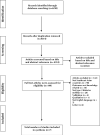Systematic Review and Meta-Analysis of Diabetes Knowledge among Type 2 Diabetes Patients in Southeast Asia
- PMID: 34852899
- PMCID: PMC9380083
- DOI: 10.1900/RDS.2021.17.82
Systematic Review and Meta-Analysis of Diabetes Knowledge among Type 2 Diabetes Patients in Southeast Asia
Abstract
OBJECTIVE: Recognition of patient baseline knowledge is important in educating patients with type 2 diabetes mellitus (T2D) to manage their disease effectively. The purpose of this study is to review current evidence on the level of diabetes knowledge among T2D patients and determine factors affecting their knowledge. METHODS: A systematic search of English language articles published between 1990 and June 2019 was conducted using six electronic databases. Only quantitative studies that assessed knowledge of T2D patients in Southeast Asian countries were included. Data were extracted and a meta-analysis was conducted. RESULTS: A total of 6210 articles were retrieved; seven articles met the inclusion criteria, comprising 1,749 T2D patients. The calculated mean knowledge score was 55.6% (95% CI: 7.6 to 103.6). Five types of assessment tools were identified ranging from five to 41 questions that focused on disease specifics, treatment, and nutrition. Age, education level, and glycemic control were the most common factors impacting knowledge. CONCLUSIONS: The level of knowledge among T2D patients in Southeast Asia was unsatisfactory, especially in older patients with low education levels and poor glycemic control. Hence, an appropriate educational plan should be prioritized to these groups.
Conflict of interest statement
The authors report no conflict of interests.
Figures
Similar articles
-
Beyond the black stump: rapid reviews of health research issues affecting regional, rural and remote Australia.Med J Aust. 2020 Dec;213 Suppl 11:S3-S32.e1. doi: 10.5694/mja2.50881. Med J Aust. 2020. PMID: 33314144
-
Factors associated with glycaemic control in patients with diabetes mellitus: A systematic literature review.J Clin Nurs. 2019 May;28(9-10):1433-1450. doi: 10.1111/jocn.14795. Epub 2019 Feb 12. J Clin Nurs. 2019. PMID: 30667583
-
Intake of dietary fats and fatty acids and the incidence of type 2 diabetes: A systematic review and dose-response meta-analysis of prospective observational studies.PLoS Med. 2020 Dec 2;17(12):e1003347. doi: 10.1371/journal.pmed.1003347. eCollection 2020 Dec. PLoS Med. 2020. PMID: 33264277 Free PMC article.
-
Effectiveness of interventions that assist caregivers to support people with dementia living in the community: a systematic review.Int J Evid Based Healthc. 2008 Jun;6(2):137-72. doi: 10.1111/j.1744-1609.2008.00090.x. Int J Evid Based Healthc. 2008. PMID: 21631819
-
Knowledge and associated factors towards type 2 diabetes among a rural population in the Red River Delta region, Vietnam.Rural Remote Health. 2015 Jul-Sep;15(3):3275. Epub 2015 Sep 26. Rural Remote Health. 2015. PMID: 26408862
Cited by
-
Diabetes knowledge and glycemic control among type 2 diabetes patients at public hospitals in Debre Berhan, Ethiopia.PLoS One. 2025 Jan 30;20(1):e0317288. doi: 10.1371/journal.pone.0317288. eCollection 2025. PLoS One. 2025. PMID: 39883698 Free PMC article.
-
Medication Knowledge and Adherence in Type 2 Diabetes Mellitus Patients in Brunei Darussalam: A Pioneer Study in Brunei Darussalam.Int J Environ Res Public Health. 2022 Jun 18;19(12):7470. doi: 10.3390/ijerph19127470. Int J Environ Res Public Health. 2022. PMID: 35742719 Free PMC article.
-
Development and validation of patient diabetes knowledge questionnaire (PDKQ).J Pharm Policy Pract. 2023 Oct 19;16(1):121. doi: 10.1186/s40545-023-00631-3. J Pharm Policy Pract. 2023. PMID: 37858279 Free PMC article.
-
Diabetes knowledge among Malaysian adults: A scoping review and meta-analysis.Malays Fam Physician. 2024 Apr 27;19:26. doi: 10.51866/rv.304. eCollection 2024. Malays Fam Physician. 2024. PMID: 38725609 Free PMC article.
-
Effect of Digital Tools on the Knowledge and Performance of Frontline Health Workers For Diabetes Control in Myanmar: Cost-Effective Analysis and Quasi Experimental Study.JMIR Nurs. 2025 Jun 16;8:e72230. doi: 10.2196/72230. JMIR Nurs. 2025. PMID: 40523215 Free PMC article.
References
-
- IDF Diabetes Atlas (Ninth Edition) Committee . International Diabetes Federation. https://www.who.int/health-topics/cardiovascular-diseases/#tab=tab_1 . Accessed on 2019.
-
- Gerstein HC. Diabetes: dysglycaemia as a cause of cardiovascular outcomes. Nat Rev Endocr 2015. 11(9): 508-510. - PubMed
Publication types
MeSH terms
LinkOut - more resources
Full Text Sources
Medical
Miscellaneous



